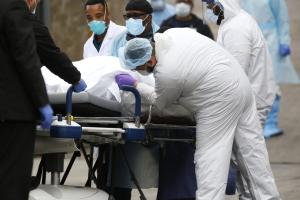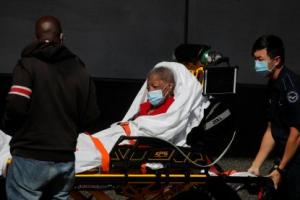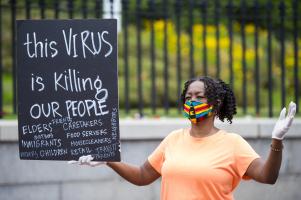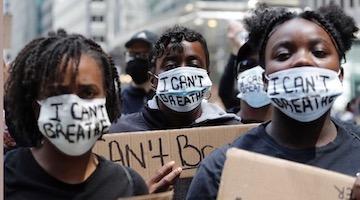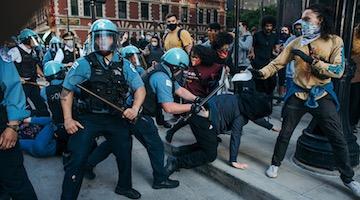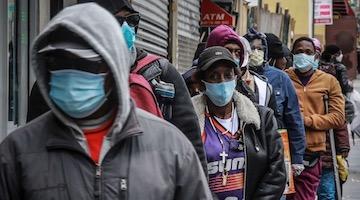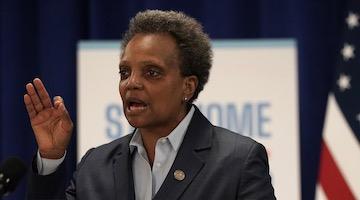In this series, we ask acclaimed authors to answer five questions about their book. This week’s featured author is Steven W. Thrasher. Thrasher holds the inaugural Daniel H. Renberg chair at Northwestern University’s Medill School, the first journalism professorship in the world created to focus on LGBTQ+ research. His book is The Viral Underclass: The Human Toll When Inequality and Disease Collide.
Roberto Sirvent: How can your book help BAR readers understand the current political and social climate?
Steven Thrasher: I hope The Viral Underclass can help readers understand what is happening in the world right now. As my book is being released, the Covid pandemic is worse in the United States than it was a year ago, with ten times the level of infection in July of 2022 and more deaths per day than in July 2021. Why is this? Why has news media largely moved on? Why has the richest nation on earth had the highest number of Covid deaths? (And related, why is it that countries left devastated by colonialism in the global south have had lower Covid death rates, while the countries that benefit from colonialism have far higher Covid death rates—the opposite of the usual colonizer-colonized health disparity we usually see with pandemics?) The Viral Underclass will ground readers, I hope, in confronting and sitting with the enormous level of death we have endured in America; the nation simply has been unwilling or unable to face, let along grieve about, one million deaths and counting. But I hope The Viral Underclass will also help BAR readers to see that it’s the social structures of the United States and the world that are driving this pandemic. Those same social structures are driving the emerging monkeypox epidemic and, if left unchanged, will drive any future pandemics. They will also make the road to climate chaos full of viral pandemics.
What do you hope activists and community organizers will take away from reading your book?
Viruses have so much to teach us. They offer us so many lessons to change the way we live for the better. In the past, pathogens have reshaped our day-to-day lives. HIV led to adopting universal precautions. Cholera led Chicago to raze whole neighborhoods, put in sewers, reverse the direction of the Chicago River and build anew in a way that ended cholera deaths. Influenza led to ambitious ventilation infrastructure. There is so much still to learn from the Covid pandemic! And the odds for creating a new politics of care in the world are better now, in some ways, deep into this pandemic, because millions (if not billions) learned for the first time about mutual aid and anarchy in surviving thus far. I hope community activists find in my book a space to mourn and to recognize all that has been lost; then, I hope they can take away that there is so much left to do that can still be done—both for pandemics but also for the climate.
An activist once taught me that if you care about someone harmed by a virus, you can’t just wish for a magic wand to get rid of the virus so you can walk away. If you really care about that person, you recognize that the reason they are living with a virus is about a lot of things that happened before the moment of infection. Even if the virus goes away or is treated, those conditions still remain. I hope activists can build on what the pandemic has laid bare and use The Viral Underclass to imagine paths to a politics of care.
We know readers will learn a lot from your book, but what do you hope readers will un-learn? In other words, is there a particular ideology you’re hoping to dismantle?
What a great question! There are four things I hope The Viral Underclass will help readers unlearn: Ableism, that capitalism is the only option we have, that “choice” is a good framework for public health, and that each of us is a unique individual.
Ableism is all around us, and I hope Covid has helped people see that we privilege people with certain abilities while consigning others to death. I hope readers can unlearn the idea of blaming “sick people” for harming “healthy people.”
Capitalism is presented in the United States as the best or only option. I hope my book will help readers to see that capitalism is a set of relations, and it doesn’t produce healthy results; while Cuba and China have fared relatively well throughout the pandemic, the U.S. has had the most deaths because capitalism creates the conditions for viral transmission, sickness and death.
When I finished the book, Roe v. Wade was still the law of the land. Now, it is not. I hope The Viral Underclass will help readers unlearn that “choice” is always a good framework for healthcare; choice is part of the mirage neoliberal capitalism, and there are better frameworks for demanding health equity.
Finally, I hope my book can help each reader unlearn the myth that I am an individual, and that they are an individual, and we are all discrete beings that do not share biological matter, let alone a shared destiny.
Which intellectuals and/or intellectual movements most inspire your work?
I am deeply informed by the people I wrote about in The Viral Underclass: disability activist Alice Wong, my late Village Voice editor Ward Harkavy, lawyer Chase Strangio, trans Latina activists Jennicet Gutiérrez and Lorena Borjas, and HIV activists Thomas Strong, Zak Kostopolous, Sean Strub and Michael Johnson. But I am deeply informed by many others, including some I am honored to call friends: the late music critic Greg Tate, journalist Linda Villarosa, anthropologist Adia Benton, epidemiologist Gregg Gonsalves, historian and novelist Sarah Schulman, queer theorist Lisa Duggan, sociologist and “Godmother of Afrofuturism” Alondra Nelson, novelist and social critic Robert Jones, Jr., disability and animal rights activist Sunaura Taylor, writer Kiese Laymon, cinematographer Arthur Jaffa, critical race theorists Victor Ray and Kendall Thomas, journalist Lewis Raven Wallace, filmmaker Marlon Riggs, poets Essex Hemphill and Danez Smith, medical historian Monica Greene, geographer Ruth Wilson Gilmore, abolitionist Mariame Kaba, historian Keeanga-Yamahtta Taylor, decolonial theorist Franz Fanon, HIV virologist Rich D’Aquila, philosopher Olúfẹ́mi O. Táíwò, composers Philip Glass, Alice Coltrane Julius Eastman, journalist Ida B. Wells, of course James Baldwin and bell hooks, and queer historians Kevin Murphy, Kevin Mumford, and Hugh Ryan. My work is deeply informed by anarchy, the concepts of mutual aid and abolition, the movement for Black Lives, the disability rights movement, the Gay Liberation Front, the movement to reclaim queer pride, Occupy Wall Street, the movements to understand “pinkwashing” and “homonationalism,” and the boycott movements organized by and for the people of South Africa and of Palestine.
Which two books published in the last five years would you recommend to BAR readers? How do you envision engaging these titles in your future work?
Talk about unlearning from your previous question!
I highly recommend Kiese Laymon’s memoir Heavy and Robert Jones, Jr.’s novel The Prophets. They have both taught me so much and helped me to unlearn so much.
Heavy is such a tremendously, profoundly important text for unlearning fatphobia and for understanding how to love, honor and wrestle with Blackness, fatness, shame, sexual abuse and healing in America. In what I think will be my third book, a memoir called Illegitimate, Laymon’s book Heavy is heavily shaping how I think about what it means to be considered legitimate (or illegitimate) in this country depending on if your parents were married when you were conceived, or not. (And in many other ways.) But the beauty of Heavy is that it speaks to so many people on so many levels.
The story of love between enslaved people of the same gender on an antebellum plantation, The Prophets has been a finalist for or won just about every literary prize—and rightfully so. But it speaks to me for a particular reason. The plantation in The Prophets is set in Vicksburg, Mississippi, a town where I once had to work for a few weeks. My experience in Vicksburg was traumatizing. For years, I have wanted to write about working there in the context of Vicksburg being where the Union Army got control of the Mississippi River and where a confederate general surrendered to the Union on July 4, 1863—leading to the town refusing to celebrate the Fourth of July until the 1980s. And in Illegitimate, I will do so. But I will write about how The Prophets helped me unlearn the trauma of Vicksburg—an Afrofuturist imagined story from the past helping me to imagine a better future.
Roberto Sirvent is editor of the Black Agenda Report Book Forum.

